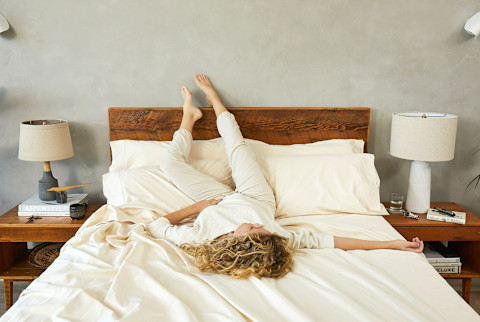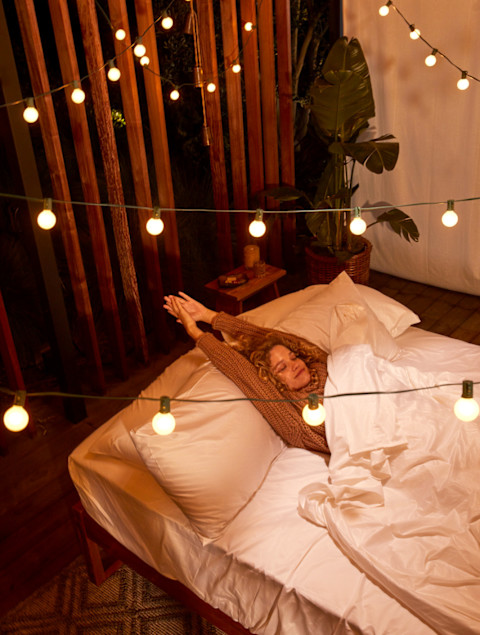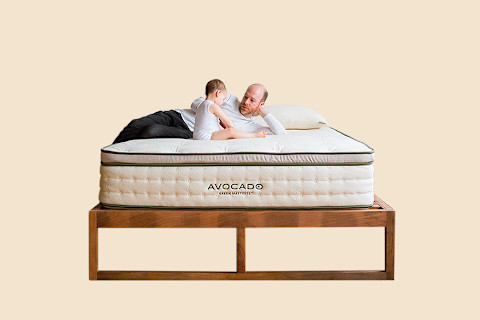How To Break Your Sleep Procrastination Habit & Get The Rest Your Body Needs

Getting yourself out of bed in the morning can be hard—but actually, sometimes getting yourself into bed can be downright excruciating. It's not that we have a hard time falling asleep (that's another story); it's that we just won't go to bed when we know we need to or when we're tired. Just as we can procrastinate about work, errands, and exercise, we can regularly procrastinate about going to sleep, and you're far from alone if you do it.
Who sleep procrastinates?
Sleep procrastinators aren't just the folks who are binge-watching the same shows as you—they're people trying to finish up work, getting their exercise in at night, doing things around the house, or simply scrolling through social media or browsing the internet in a state of boredom. In other words, most—if not all—of us have been there.
In a study on bedtime procrastination, half of the 177 participants reported going to bed later than they wanted to at least twice a week1. Experts cite our 24/7 work culture and obsession with technology and social media as big culprits contributing to why we put off going to sleep—even if we're exhausted. In the bigger picture, more than a third of adults2 in the U.S. aren't meeting the health guideline of seven hours of sleep, according to the CDC. That's a problem considering that inadequate sleep over time has been linked to issues like high blood pressure, diabetes, and weight gain, according to their research.
What happens when we put off going to sleep
Say you're physically beat, but you want to watch one more episode or get to inbox zero. When you don't let yourself go to sleep when you're tired, the body releases the stress hormone cortisol to meet the demands of staying awake, overriding your natural circadian rhythm, or the body's sleep/wake cycle.
What happens next is a feeling of wakefulness, or feeling tired but wired, which can make it even harder to go to sleep when we're finally ready. According to sleep experts, this is all thanks to an evolutionary survival mechanism that, thousands of years ago, might have been helpful because staying awake was a matter of life or death. These days, it's more likely that what you're doing can wait until tomorrow.
3 ways to beat bedtime procrastination.
Yet hitting the hay at a healthy and appropriate time isn't just about brute willpower—it requires awareness and a willingness to build good sleep hygiene habits. (And a bed you want to get into helps, too, of course.)
1. Set boundaries with blue light.
For one sleep expert to be in bed by 10:30 p.m., she explains, "I need to shut down electronics around 9 p.m. This is a nonnegotiable. Having electronics open after 9 p.m. is effectively taking a shot of espresso at bedtime."
By now, we're all well aware that the blue light from our computers, phones, and TV screens fools our brain into thinking it's still daytime by messing with our melatonin levels, making sleep more difficult. But many of us can't quit bombarding ourselves with light right up until we close our eyes in bed. While amber glasses and blue light settings on your devices can help (research suggests cutting out blue light at least two hours before bed), consider tucking away your tech completely during bedtime if you can.

2. Make your bed an inviting space.
Your sleep environment is a big factor for obvious reasons. Dim the lighting, use a little lavender or chamomile aromatherapy if it helps you feel calm, and set up your bed so that you ultimately look forward to bedtime.
Keeping your body cool can help you fall asleep as your body temperature plays an important role in regulating your circadian rhythm. A simple swap like more breathable linens can make all the difference. Avocado's sustainably and naturally made Organic Suvin Cotton Sheets have that extra-soft feel with a silky sateen finish but won't give you the night sweats when you're wrapped up in them, not to mention, these luxurious sheets are the epitome of covetable covers: Only a few thousand bales of this particular heritage cotton are grown each year in southern India.
And if you can invest in a mattress that keeps your back aligned, alleviates pressure points and relieves back pain, and supportively contours to your body's natural curves, do it. The Green and Vegan mattresses by Avocado are made to do just that, using 100% GOTS-certified organic material (and nothing toxic). So when you do fall asleep, you're getting deep, restorative rest throughout the night.
3. Notice when you feel that first wave of tiredness hit—then take action.
Your body isn't meant to fall asleep on command, so forget pressuring yourself by trying to force a specific bedtime every night. Instead, it's helpful to know your "sleep window," that range of an hour or so when your body can fall asleep naturally.
Finding what that window is for you will take some awareness. Notice when you first start feeling that nudge of tiredness at the end of your day—maybe it's when you curl up on the couch at 9:30 p.m, feeling too lazy to do anything but scroll through your phone. Even if your first instinct is that it's too early for bed, this might be your circadian rhythm calling—your body signaling it's time to get that sleep.
Fight the urge to open up Instagram or check one more thing off the to-do list and start the process of showering, brushing your teeth, changing into your PJs, whatever it is you do to get ready for bed—then crawl right into it. No more dozing off on the couch, only to wake up 30 minutes later and deliriously rush through your routine. After a total night's rest, your body will thank you in the morning.



